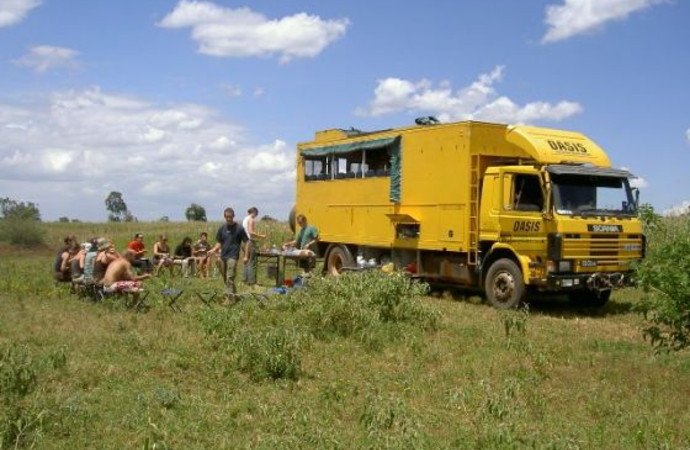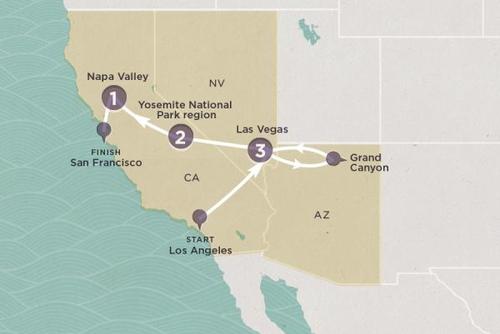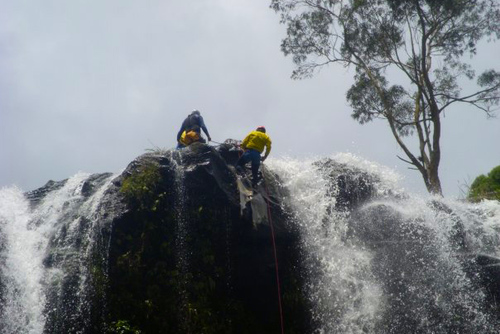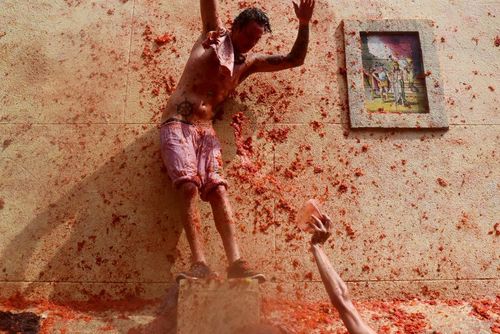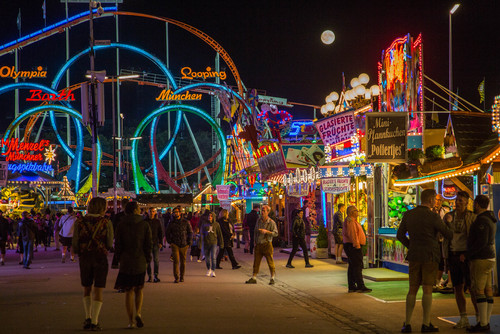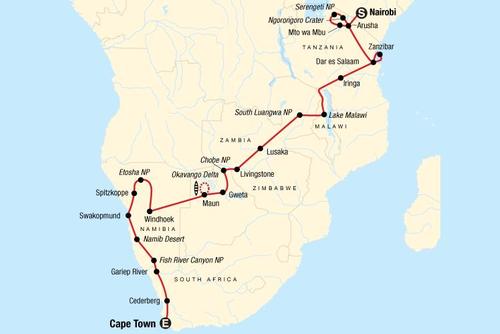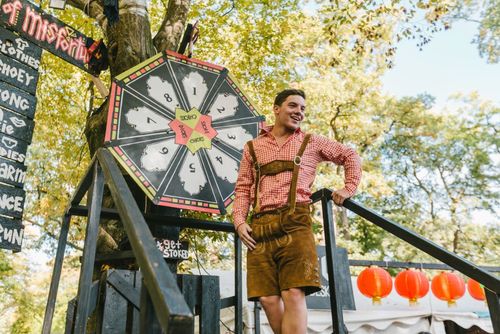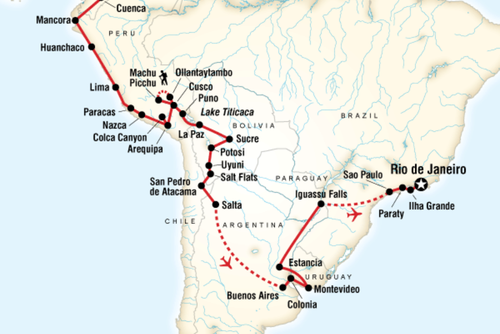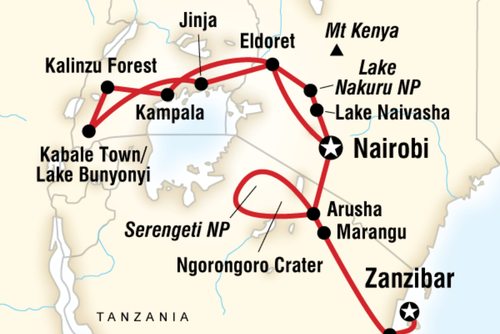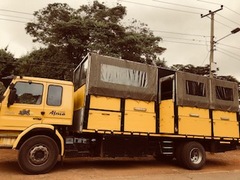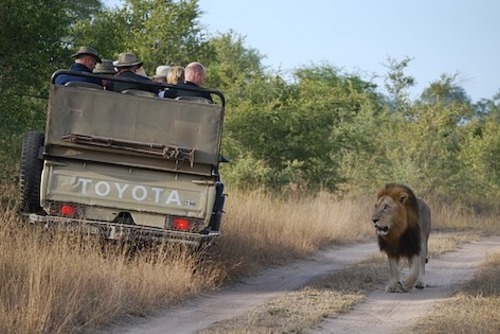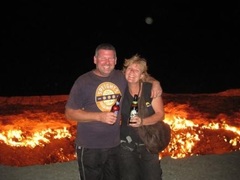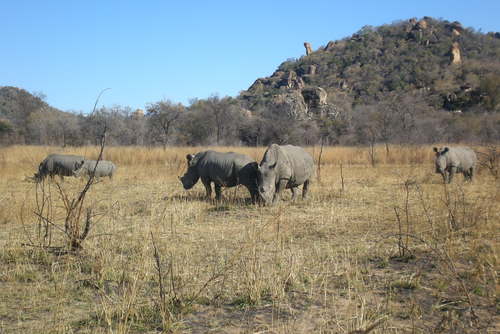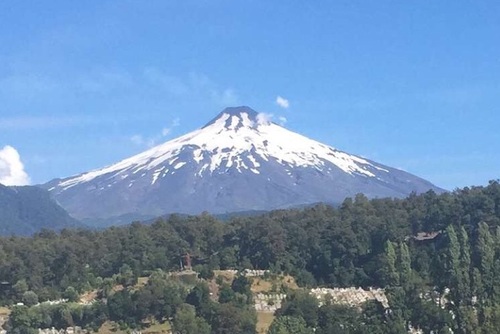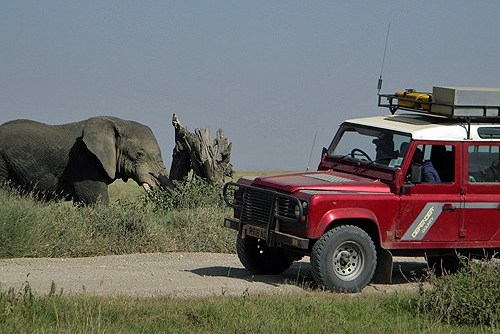There are so many reasons why solo travellers should consider going backpacking independently and also book a group tour.
Tours offer a great way to visit hard-to-reach destinations, without a lot of the difficulties that often go with solo backpacking. But what exactly are group tours, and are they for you?
If you don’t know what an overland truck is, it means you haven’t seen one. Once you have, it won’t be easily forgotten. Imagine a medium-sized heavy goods vehicle, the kind you’ve got stuck behind more times than you can remember.
Whip off the container where all the goods are kept, and replace it with a fully self-sustaining cab, complete with about 25 seats facing in multiple directions, storage for all the passengers’ luggage and enough food to keep them fed for weeks, as well as an operational camping kitchen capable of cooking mass meals and cleaning up afterwards.
Include a miniature mechanic’s store, with spare parts that include two extra wheels, and a compartment for around 15 large tents. Now gear it up to face miles of dirt track in Turkmenistan, freezing cold winds in Tierra del Fuego, baking hot deserts in Sudan and bog-holes the size of small cargo ship in Cameroon.
Add a horn so loud it’ll make your stomach fall out (and maybe get you through the traffic in La Paz), and you’ve just about got the idea.
Top Rated Overland Tour Companies
These behemoths, operated by a number of UK and global companies, the best of which it is commonly agreed are G Adventures, Oasis Overland and Dragoman, have been cavorting around Latin America, Asia and Africa for decades, and are a familiar sight to many of the locals who live on the now well-beaten paths.
For them, they represent just another form of tourism, a different way for travellers to visit their town and, hopefully, spend some money. For the passenger aboard, however, overlanding (to use the verb) is usually the summation of months, if not years, of scrimping and saving, planning for that ‘once in a lifetime’ trip.
So why have they placed their trust and hard-earned cash in an overland trip?
What do Group Tours Offer that Solo Travelling Doesn’t? Is it Worth it?
I should, at this juncture, declare an interest. I have travelled on two overland trips – one in South America, one in Africa – and I have some good friends who work in the industry.
I’ve also, however, backpacked on my own through Asia, so I feel I can at least make some sort of comparison.
Overlanding is a fantastic way to see parts of the world that are otherwise incredibly difficult to get to, and you get to do it with a bunch of like-minded people who you’ll get to know inside out (sometimes literally, thanks to the omnipresent stomach bugs).
They are inclusive as everyone gets involved in every part of the trip. And they are cost-effective, offering a way to cover lots of ground and pack in a great deal in a relatively short time.
To make the point, in this article I’ll briefly look at a few of the ways in which overlanding offers advantages over solo travelling.
Top Reasons to Book with a Tour Company
An overland trip takes out many of the dreary and often problematic procedural aspects of travelling, not least the act of actually moving around.
On an overland truck, getting about goes from being a constant source of concern and at times distress to being something you never have to worry about (apart from changing the odd wheel, which is a group activity, made harder when a spanner is dropped on your foot by the driver).
I don’t consider waiting at a bus stop in a dusty nowhere town in 40 degree heat for three hours, only to find out the buses don’t run on Tuesdays despite the guy in the ticket office (which is inexplicably two miles away from the bus stop) telling you they definitely do, a positive travel experience.
When you’re on an overland trip, you get up, put your tent away or leave the hostel, eat breakfast, get straight on the truck, and you’re off. (Also, you get to control the music on the truck, which usually has an iPod adapter. Anyone who has sat on a bus in Cambodia with the oppressively loud karaoke video playing will understand why this is important.)
There’s no hike to the bus stop or train station, no deciphering of timetables, no predatory salesmen trying to flog you a fake Swiss army knife while you wait (what is that all about, anyway?), and you get driven right to your next destination, where you accommodation is booked and ready, so no walking around when you turn up wondering where you are and why this street isn’t on your Lonely Plant map.
Also, often you’ll be heading to somewhere truly in the middle of nowhere, and the local transport may not even go there. In this way, overland trucks can take you to unique and inaccessible destinations off limits to independent travellers.
Another issue is food. Solo travelling can at time become a singular quest to find something edible, especially when on long bus trips. In some parts of the world, such as exploring the best places in South East Asia where food is everywhere and delicious this isn’t much of a problem; indeed it is one of the pleasures of visiting.
But when you find yourself in the Namib desert at one in the afternoon, you can either hope that you remembered to buy something on the way to the bus stop, or that there is a hardy and entrepreneurial chap when the bus stops selling hot dogs (just so you know, there isn’t).
On an overland truck, many of the meals are provided, so in that situation it’d be a case of pulling over, making up a pasta salad prepared the night before by the cook group (usually passengers who take it in turns), pulling up a chair and digging in. If you’re lucky you might even have a beer left in the cool box.
As for evening meals, these are again put together by the passengers. Sitting around a fire at a bush-camp (camping out in the middle of nowhere, because there’s no campsite around), tucking into a freshly prepared meal and chatting away to your fellow passengers is the kind of experience you can only have on an overland truck, and has provided some of my most memorable travelling moments.
Add-on excursions are also made easier. When you’re backpacking, you are a tourist. Yes, that’s a dirty word for some who insist they’re ‘travelling’ and aren’t on holiday, but the truth is you are a tourist, and tourists like to take trips to places of interest – after all, isn’t that the point of going?
If you were to say something like ‘oh, I’m not going to go to Machu Picchu, I mean, it’s so touristy’, then you are an idiot. That rant aside, when you’re away and decide to go on these trips, organising them can be difficult.
Often you’ll turn up to discover the tours are full, or there aren’t enough people to run them that day. Then there is the problem of finding a decent tour company.
Those of us who are into responsible tourism will want to book with a locally-owned company who employ local guides, keeping your money in the community you’re visiting.
To give one example, when in South America we were due to hit a small town called El Chalten, where the local activity – and main reason for going – was that you could hike to a glacier, walk on it and do a bit of ice climbing.
We were on an overland truck, and three days before we got there our tour leader asked “who wants to go glacier trekking in El Chalten on Friday?” About ten of us raised our hands. “It’s be $75, I’ll book it tomorrow, pay them when you do it”.
On Friday, we woke up, went to the local tour operator, and off we went. Also on the hike were an Australian couple. We soon learned they had been in El Chalten for three days, and had spent the whole time waiting to go glacier trekking, but hadn’t been able to get in until that day.
We asked them what they’d done the last three days, as El Chalten was not a big place. His direct response: “bugger all, it’s been boring”. None of this on an overland truck: roll in, do what you came to do, roll out.
Finally and perhaps most importantly, are the people. Solo backpackers will be familiar with the process of rocking up to a hostel, getting to your dorm and then cracking on with the important business of heading to the bar to see who’s there and what’s going on.
This is one of the great joys of travelling; you never know who you might end up meeting and where it will lead. A hostel bar can be an affirmation of the William Butler Yeats quote, repeated on the walls of Irish bars throughout the world, that ‘there are no strangers here, only friends you haven’t met yet.’ As you read this, this is going on somewhere in the world.
It can also, however, be dispiriting and monotonous, as you find yourself having the same conversations again and again. “Where are you from?”; “where have you been on your travels so far?”; “what do you do for a living?”; and “when do you head home?”
On an overland truck, especially on the longer trips, you share every experience, good and bad, and all get stuck in to each part of the journey. You cook each other’s dinner, help the driver maintain the truck and keep it clean, sit round a camp fire night after night with each other, getting to know them.
The “where are you from?” discussion is out of the way after the first night, and then you start developing a real understanding with your fellow passengers, what they’re really like. The banter and mutual piss-taking of an overland group gives you an indication of how comfortable the passengers are with one another.
This develops over the whole trip, from the highs of a night spent camping out under the starts in the Peruvian desert to the lows of trying to get your tents down in the midst of a Patagonian gale (which requires exceptional teamwork, and everyone to get up on time; sorry about that).
The result, in my experience, is a number of strong friendships that are as deep and resilient as those you have with your lifelong school buddies, compared with the fleeting shared experience of a couple of nights in the same hostel of solo travelling.
There is a reason I keep in touch with so many of my fellow passengers from trips taken years in the past, and also why once you get into the overlanding bubble you become aware of just how many married couples had their first meeting on an overland truck.
Overall
All this said, I’m not putting down backpacking independently, and overlanding is not without its downsides.
There is a huge amount to be said for taking a journey on your own, and completing it against often tricky odds. Moreover, it is just as possible to nurture meaningful and long-lasting relationships with other travellers when you go solo.
And on the flipside, if you find yourself in the company of someone you’re less than enthusiastic about, you can easily get rid of them, rather than be stuck in a truck with them for weeks on end (falling outs can and do happen).
But when you plan your foreign adventure, be aware that there is a wide and wonderful world of overlanding out there, which offers a unique opportunity to see incredibly things with a great group of people.
You could even incorporate some overlanding into a longer trip? Many do. The trucks, and their usually slightly unhinged crew, are at your chosen destination, just waiting for you to sign up.
Find Your Next Adventure
- Africa overland tours
- Asia overland tours
- Europe overland tours
- North America overland tours
- Central America overland tours
- South America overland tours
- Australasia overland tours
By Jon Provan

